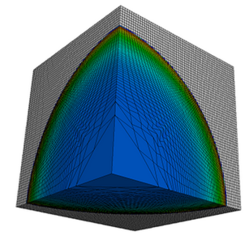LULESH

LULESH is the Livermore Unstructured Lagrangian Explicit Shock Hydrodynamics.
To run this test with the Phoronix Test Suite, the basic command is: phoronix-test-suite benchmark lulesh.
Project Site
computing.llnl.govTest Created
4 March 2020Last Updated
11 January 2021Test Maintainer
Michael LarabelTest Type
ProcessorAverage Install Time
3 SecondsAverage Run Time
2 Minutes, 8 SecondsTest Dependencies
OpenMPI + C/C++ Compiler ToolchainAccolades
20k+ DownloadsSupported Platforms
** Data based on those opting to upload their test results to OpenBenchmarking.org and users enabling the opt-in anonymous statistics reporting while running benchmarks from an Internet-connected platform.
*** Test profile page view reporting began March 2021.
Data updated weekly as of 16 January 2025.
Suites Using This Test
Performance Metrics
Analyze Test Configuration:LULESH 2.0.3
OpenBenchmarking.org metrics for this test profile configuration based on 1,896 public results since 10 January 2021 with the latest data as of 25 December 2024.
Below is an overview of the generalized performance for components where there is sufficient statistically significant data based upon user-uploaded results. It is important to keep in mind particularly in the Linux/open-source space there can be vastly different OS configurations, with this overview intended to offer just general guidance as to the performance expectations.
Based on OpenBenchmarking.org data, the selected test / test configuration (LULESH 2.0.3) has an average run-time of 2 minutes. By default this test profile is set to run at least 3 times but may increase if the standard deviation exceeds pre-defined defaults or other calculations deem additional runs necessary for greater statistical accuracy of the result.
Based on public OpenBenchmarking.org results, the selected test / test configuration has an average standard deviation of 0.3%.
Does It Scale Well With Increasing Cores?
Yes, based on the automated analysis of the collected public benchmark data, this test / test settings does generally scale well with increasing CPU core counts. Data based on publicly available results for this test / test settings, separated by vendor, result divided by the reference CPU clock speed, grouped by matching physical CPU core count, and normalized against the smallest core count tested from each vendor for each CPU having a sufficient number of test samples and statistically significant data.
Notable Instruction Set Usage
Notable instruction set extensions supported by this test, based on an automatic analysis by the Phoronix Test Suite / OpenBenchmarking.org analytics engine.
This test profile binary relies on the shared libraries libmpi.so.40, libm.so.6, libgomp.so.1, libc.so.6, libopen-pal.so.40, libopen-rte.so.40, libhwloc.so.15, libz.so.1, libudev.so.1.
Tested CPU Architectures
This benchmark has been successfully tested on the below mentioned architectures. The CPU architectures listed is where successful OpenBenchmarking.org result uploads occurred, namely for helping to determine if a given test is compatible with various alternative CPU architectures.
Recent Test Results
 Compare
Compare
|
1 System - 85 Benchmark Results |
AMD Ryzen 9 5900X 12-Core - ASRock X570 Steel Legend - AMD Starship Ubuntu 24.10 - 6.11.0-13-generic - GNOME Shell 47.0 |
|
1 System - 87 Benchmark Results |
Rockchip ARMv8 Cortex-A76 - Turing Machines RK1 - 16GB Ubuntu 22.04 - 5.10.160-rockchip - OpenCL 2.0 pocl 1.8 Linux +Asserts RELOC LLVM 11.1.0 SLEEF POCL_DEBUG |
|
1 System - 1 Benchmark Result |
2 x INTEL XEON PLATINUM 8558P - XFUSION 2288H V7 BC15MBSA - Intel Device 1bce Red Hat Enterprise Linux 8.10 - 4.18.0-553.el8_10.x86_64 - GCC 8.5.0 20210514 |
|
3 Systems - 126 Benchmark Results |
ARMv8 Cortex-A53 - Radxa ROCK 2A - 4096MB Debian 11 - 5.10.160-38-rk356x - X Server 1.20.11 |
|
2 Systems - 84 Benchmark Results |
Intel Core Ultra 9 285K - ASUS ROG MAXIMUS Z890 HERO - Intel Device ae7f Ubuntu 24.10 - 6.11.0-9-generic - GNOME Shell 47.0 |
|
Featured Memory Comparison |
|
|
1 System - 461 Benchmark Results |
AMD Ryzen 7 5800X 8-Core - GIGABYTE MC12-LE0-00 v01000100 - AMD Starship Ubuntu 24.04 - 6.11.0-061100-generic - GNOME Shell 46.0 |
|
1 System - 336 Benchmark Results |
AmpereOne - Supermicro ARS-211M-NR R13SPD v1.02 - Ampere Computing LLC Device e208 Ubuntu 24.04 - 6.8.0-39-generic-64k - GCC 13.2.0 |
|
5 Systems - 531 Benchmark Results |
AMD EPYC 7702 64-Core - Supermicro Super Server H12SSL-NT v1.02 - AMD Starship Debian 12 - 6.8.8-2-pve - NVIDIA |
|
1 System - 102 Benchmark Results |
AMD Ryzen 9 9950X 16-Core - ASUS ROG STRIX X670E-E GAMING WIFI - AMD Device 14d8 Ubuntu 24.04 - 6.10.0-phx - GNOME Shell 46.0 |
|
1 System - 57 Benchmark Results |
AMD Ryzen 9 7950X3D 16-Core - ASUS TUF GAMING X670E-PLUS WIFI - AMD Device 14d8 Ubuntu 22.04 - 6.5.0-44-generic - GNOME Shell 42.9 |